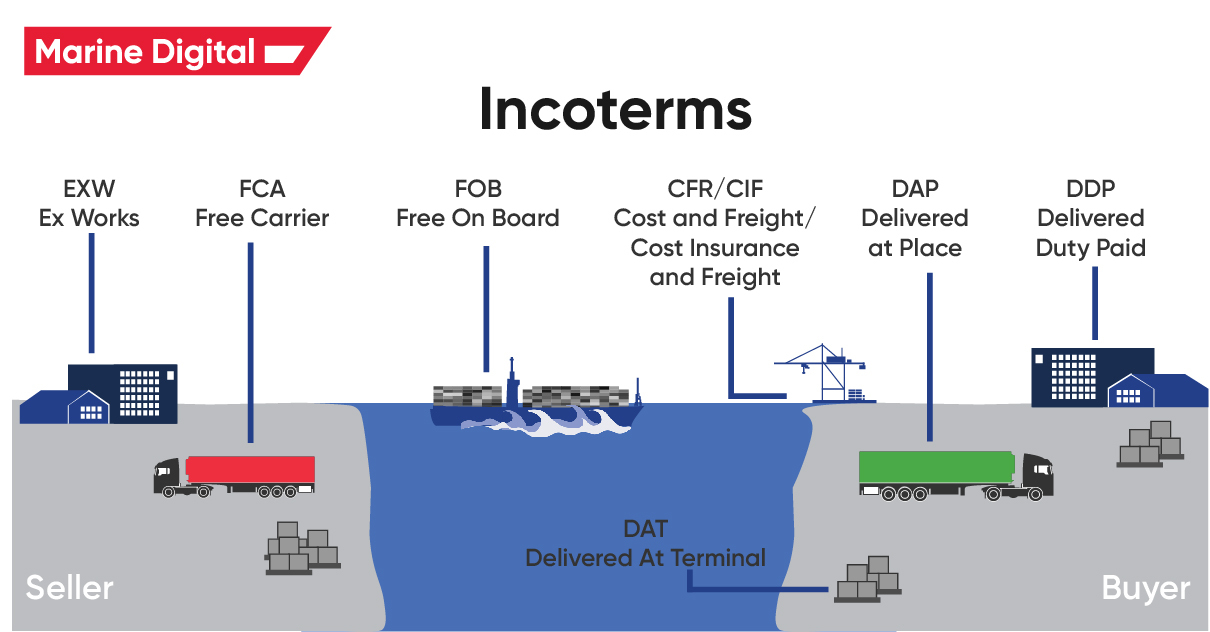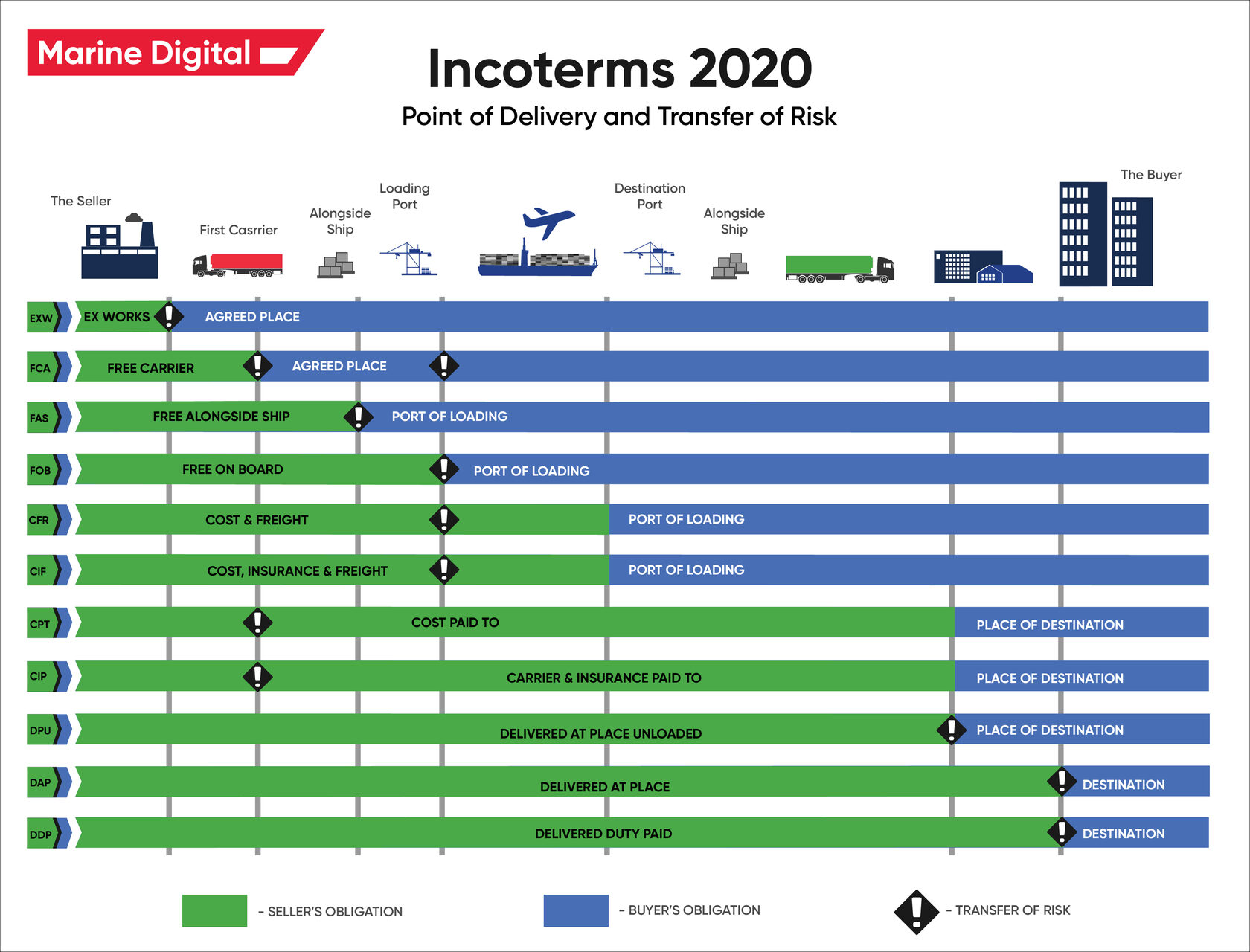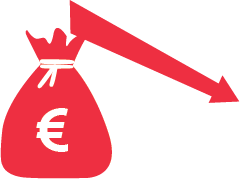Incoterms 2020. Point of Delivery and Transfer of Risk
ICC's world-renowned Incoterms® rules facilitate trillions of dollars in global trade each year.

The Incoterms rules are the world's essential terms of trade for the sale of goods. Whether you are filing a purchase order, packaging and labelling a shipment for freight transport, or preparing a certificate of origin at a port, the Incoterms rules are there to guide you. The Incoterms rules provide specific guidance to individuals participating in the import and export of global trade on a daily basis.
What are Incoterms rules?
Since its founding in 1919, ICC has been committed to the facilitation of international trade.
Different practices and legal interpretations between traders around the world necessitated a common set of rules and guidelines. As a response, ICC published the first Incoterms rules in 1936. Since then, it has been supporting and developing them.
The world business organization was pleased to announce the publication of Incoterms® 2020, as ICC celebrated its Centenary in 2019. The newest edition of the Incoterms rules will help prepare businesses for the next century of global trade.
Different practices and legal interpretations between traders around the world necessitated a common set of rules and guidelines. As a response, ICC published the first Incoterms rules in 1936. Since then, it has been supporting and developing them.
The world business organization was pleased to announce the publication of Incoterms® 2020, as ICC celebrated its Centenary in 2019. The newest edition of the Incoterms rules will help prepare businesses for the next century of global trade.
Who publishes the Incoterms rules?
Although other clauses for global trade exist around the world, such as the Harmonised Tariff Schedule of the United States, Incoterms rules are global in their reach. Similarly, Incoterms rules do not include trade terms codified for national purposes, such as the "less than truckload shipping" (LTL) rule of the United States. Unlike national trade policies, Incoterms rules are universal, providing clarity and predictability to business.
Why use Incoterms rules in international trade?

"Incoterms®" is a trademark of the International Chamber of Commerce, registered in several countries. "Incoterms®" is an acronym standing for international commercial terms.These terms hold universal meaning for buyers and sellers around the world.
What does "Incoterms®" stand for?
Incoterms 2020. Point of Delivery and Transfer of Risk
The seller makes the goods available at his/her premies. This term places the maximum obligation on the buyer and minimum obligations on the seller. The Ex Works term is often used when making an initial quotation for the sale of goods without any costs included. EXW means that a buyer incurs the risks for bringing the goods to their final destination. The seller does not load the goods, he does so at buyer's risk and cost. If parties wish seller to be responsible for the loading of the goods on departure and to bear the risk and all costs of such loading, this must be made clear by adding explicit wording to this effect in the contract of sale.
The buyer arranges the pickup of the freight from the freight from the supplier's designated ship site, owns the in-transit freight, and is responsible for clearing the goods through Customs. The buyer is also responsible for completing all the export documentation.
These documentary requirements may cause two principal issues. Firstly, the stipulation for the buyer to complete the export declaration can be an issue in certain jurisdictions (not least the European Union) where the customs regulations require the declarant to be either an individual or corporation resident within the jurisdiction. Secondly, most jurisdictions require companies to provide proof of export for tax purposes. In an Ex-Works shipment the buyer is under no obligation to provide such proof, or indeed to even export the goods. It is therefore of utmost importance that there matters are discussed with the buyer before the contract is agreed. It may well be that another Incoterm, such as FCA seller's premises, may be more suitable.
The buyer arranges the pickup of the freight from the freight from the supplier's designated ship site, owns the in-transit freight, and is responsible for clearing the goods through Customs. The buyer is also responsible for completing all the export documentation.
These documentary requirements may cause two principal issues. Firstly, the stipulation for the buyer to complete the export declaration can be an issue in certain jurisdictions (not least the European Union) where the customs regulations require the declarant to be either an individual or corporation resident within the jurisdiction. Secondly, most jurisdictions require companies to provide proof of export for tax purposes. In an Ex-Works shipment the buyer is under no obligation to provide such proof, or indeed to even export the goods. It is therefore of utmost importance that there matters are discussed with the buyer before the contract is agreed. It may well be that another Incoterm, such as FCA seller's premises, may be more suitable.
EXW - Ex Works
The seller delivers the goods, cleared for export, at a named place. This can be to a carrier nominated by the buyer, or to another person nominated by the buyer.
It should be noted that the chosen place of delivery has an impact on the obligations of loading ang unloading the goods at that place. If delivery occurs at the seller's premises' the seller is responsible for loading the goods on to the buyer's carrier. Howerer, If delivery occurs at any other place, the seller is deemed to have delivered the goods once their transport has arrived at the namedplace; the buyer is responsible for both unloading the goods and loading them on to their own carrier.
It should be noted that the chosen place of delivery has an impact on the obligations of loading ang unloading the goods at that place. If delivery occurs at the seller's premises' the seller is responsible for loading the goods on to the buyer's carrier. Howerer, If delivery occurs at any other place, the seller is deemed to have delivered the goods once their transport has arrived at the namedplace; the buyer is responsible for both unloading the goods and loading them on to their own carrier.
FCA - Free Carrier (named place of delivery)
CPT replaces the venerable C&F (cost and freight) and CFR terms for all shipping modes outside of non-containerised seafreight. The seller pays for the carriage of the goods up to the named place of destination. Risk transfers to buyer upon handing goods over to the first carrier at the place of shipment in the country of Export. The Shipper is responsible for origin costs including export clearance and freight costs for carriage to named place (usually a destination port or airport). The shipper is not responsible for delivery to the final destination (generaly the buyer's facilities), or for buying insurance. If the buyer does require the seller to obtain insurance, the Incoterm CIP should be considered.
CPT - Carriage Paid To (named place of destination)
This term is broadly similar to the above CPT term, with the exception that the seller is required to obtain insurance for the goods while in transit. CIP requires the seller to insure the goods for 110% of their velue under at least the minumum cover of the Insitute Cargo Clauses of the Institute of London Underwriters (which would be Institute Cargo Clause(C)), or any similar set of clauses. The policy should be in the same currency as the contract.
CIP can be used for all modes of transport, whereas the equivalent term CIF can only be used for non-containerized seafreight.
CIP can be used for all modes of transport, whereas the equivalent term CIF can only be used for non-containerized seafreight.
CIP - Carriage and Insurance Paid to (named place of destination)
This term means that the seller covers all the costs of transport (export fees, carriage, unloading from main carrier at destination port and destination port charges) and assumes all risk until destination port or terminal. The terminal can be a Port, Airport, or inland freight interchange. Import duty/taxes/customs costs are to be borne by Buyer.
DAT - Delivered at Terminal (named terminal at port or port or plase of destination)
Can be used for any transport mode, or where there is more than one transport mode. The seller is responsible for arranging carriage and for delivering the goods, realy for unloading from the arriving conveyance, at the named place. Duties are not paid by the seller under this term (an important difference from Delivered At Terminal DAT, where the buyer is responsible for uunloading).
DAP - Delivered at Place (named place of destination)
Seller is responsible for delivering the goods to the named place in the country of the buyer, and pays all costs in bringing the goods to the destination including import duties and taxes. The seller is not responsible for unloading. This term is often used in place of the non-Incoterm "Free In Store (FIS)". This term places the maximum obligations on the seller and minimum obligations on the buyer. With the delivery at the named place of destination all the risks responsibilities are transferred to the buyer and it is considered that the seller has completed his obligations
DDP - Delivered Duty Paid (named place of destination)
The four rules defined by Incoterms 2010 for international trade where transportation is entirely conducted by water are as per the below. It is important to note thas these terms are generally not suitable for shipments in shipping containers; the point at which risk and responsibility for the goods passes is when the goods are loaded on board the ship, and if the goods are sealed into a shipping container it is impossible to verify the condition of the goods at this point. Also of note is that the point at which risk passes under these terms has shifted from previous editions of Incoterms, where the risk passed at the ship's rail.
Sea and Inland Waterway Transport
The seller delivers when the goods are placed alongside the buyer's vessel at the named port of shipment. This means thas the buyer has to bear all costs and risks of loss of or damage to the goods from that moment. The FAS term requires the seller to clear the goods for export, which is reversal from previous Incoterms versions that required the buyer to arrange for export clearance. However, if the parties wish the buyer to clear the goods for export, this should be made clear by adding explicit wording to this effect in the contract of sale. This term can be used only for sea or inland waterway transport
FAS - Free Alongside Ship (named port of Shipment)
The seller must advance government tax in the country of origin as of commitment to load the goods on board a vessel designated by the buyer. Cost and risk are divided when the goods are sea transport in containers (see Incoterms 2010, ICC publication 715). The seller must instruct the buyer the details of the vessel and the port where the goods are to be loaded, and there is no reference to, or provision for, the use of a carrier or forwarder. This term has been greatly misused over the last there decades eve since Incoterms 1980 explained that FCA should be used for container shipments.
It means the seller pays for transportation of goods to the port of shipment, loading cost. The buyer pays cost of marine freight transportation, insurance, unloading and transportation cost from the arrival port to destination. The passing of risk occurs when the goods are in buyer account. The buyer arranges for the vessel and the shipper has to load the goods and the named vessel at the named port of shipment with the dates stipulated in the contract of sale as informed by the buyer.
Read more about What does FOB Mean in Shipping Terms?
It means the seller pays for transportation of goods to the port of shipment, loading cost. The buyer pays cost of marine freight transportation, insurance, unloading and transportation cost from the arrival port to destination. The passing of risk occurs when the goods are in buyer account. The buyer arranges for the vessel and the shipper has to load the goods and the named vessel at the named port of shipment with the dates stipulated in the contract of sale as informed by the buyer.
Read more about What does FOB Mean in Shipping Terms?
FOB - Free on Board (named port of shipment)
Seller must pay the costs and freight to bring the goods to the port of destination. However, risk is transferred to the buyer once the goods are loaded on the vessel. Insurance for the goods is NOT included. and This term is formerly known as CNF (C&F, C+F or CF)
CFR - Cost and Freight (named port destination)
Exactly the same as CFR expert that the seller must in addition prosure and pay for the insurance.
CIF - Cost, Insurance and Freight (named port of destination)
ICC last updated the Incoterms rules in 2019. While Incoterms 2020 is the most current version of the trade terms, Incoterms 2010 is still in effect today and can be accessed under our resources for business.
Read also about: Why do huge Retail companies need greener ships
Read also about: Why do huge Retail companies need greener ships
When were ICC's Incoterms rules last updated?

TOP 5 factors contributing to lower fuel costs for Shipping companies
Get a presentation with a full description of the features and free pilot project with trial of Marine Digital FOS for 2 months
"Clicking the button, you consent to the processing of personal data and agree to the privacy policy"

Get an overview "The Pathway to Zero Carbon Shipping:
IMO Compliance and CII Optimization through SEEMP" on email and download it for FREE! Leave your email now!
"Clicking the button, you consent to the processing of personal data and agree to the privacy policy, as well as consent to subscribe to the newsletter. "
Аdvantage of Fuel Optimization System from Marine Digital:

Marine Digital FOS can be integrated with other system and third-party's solutions through the API. To implement vessel performance monitoring for any vessel, we are using mathematical algorithms, machine learning and the same equipment as in FOS. The more data we collect from vessels, the more precise reports and recommendations our system will perform according to your individual requirements in fleet management.
If you have any questions about the solutions and the Marine Digital System platform, write to us, we will be happy to answer
If you have any questions about the solutions and the Marine Digital System platform, write to us, we will be happy to answer

Increased business process speed

Reducing to zero the number of errors

Best offer to the clients

Reduction in operating expenses
Have a questions?





